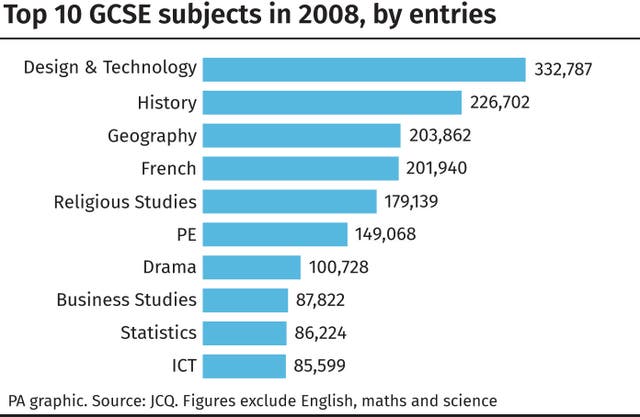GCSE religious studies increasing in popularity
Experts and school leaders suggest young people are increasingly interested in understanding different faiths.

The number of entries for GCSE religious studies has soared in the last decade, driven by young people’s increasing interest in “exploring world views”, it has been suggested.
Last year, there were more than a quarter of a million entries for the subject, up around 42% on 10 years ago, according to analysis of exam figures by the PA news agency.
Experts and school leaders said the hike reflects the “increasing importance and interest” in understanding different beliefs.
The analysis of annual UK figures shows how the most popular GCSE subjects have changed between 2008 and 2018.

Students across England, Wales and Northern Ireland will receive this year’s GCSE results on Thursday.
History and geography have both grown in popularity – this is in part likely to be driven by the English Baccalaureate, a government benchmark which recognises youngsters who take one of these two subjects along with English, maths, science and a language.
French and design and technology have both fallen in popularity, but Spanish and art and design subjects have now entered the top 10.
Drama has fallen out of the 10 most popular subjects.
This analysis excludes maths, English and science, which are taken in some form by all pupils.
The figures show that religious studies has moved from fifth most popular 10 years ago, with 179,139 entries, to third last year, with 253,618 entries.
Deborah Weston, research officer at the National Association of Teachers of RE (NATRE), and board member of the Religious Education Council of England and Wales (REC), said: “The dramatic increase in the number of pupils opting to take GCSE religious studies over the past decade reflects the value that young people place on exploring and understanding the diverse range of worldviews that exist in today’s society.
“These worldviews have never been more important, both culturally and economically, as communication and interaction between different cultures and communities expands.”
She added that there is concern that uptake of the subject at GCSE has dipped slightly since 2017, arguing that “this is a direct result of the previous Government’s policy that has led to a narrowing of the curriculum, at the expense of arts and humanities”.
Geoff Barton, general secretary of the Association of School and College Leaders (ASCL), said: “Rising entries in religious studies may well reflect the increasing importance and interest in understanding different faiths and beliefs in the modern world.”
PA’s analysis shows that the most popular subject in 2008 was design and technology, with 332,787 entries.
By last year, it had dropped to fifth with 127,232 entries – a fall of 62%.
At the same time, art and design subjects entered the top 10 last year in fourth place, with 178,891 entries.
Drama was seventh most popular 10 years ago, but has now dropped out of the top 10.
Mr Barton said: “The decline in drama and in design and technology, as well as smaller-entry creative arts subjects outside the top 10, reflects the fact that these subjects are under huge pressure.
“This is because they have been marginalised by a double whammy in which the Government has put a greater emphasis on the traditional set of academic subjects contained in the EBacc suite while it has also cut school funding in real terms making it difficult to sustain a full range of courses.”
Figures published by exams regulator Ofqual in May suggest an increase in entries for arts and design subjects this summer compared with last year.
History and geography have risen from second and third most popular in 2008 to first and second respectively last year, PA’s analysis shows.
And while French was the fourth most popular option in 2008, with 201,940 entries, it has fallen to sixth, with entries down 37% to 126,750.
But Spanish is rising in popularity, and was the eighth most popular subject last year, with 95,080 entries.
Ofqual’s figures indicate there has been a 4% increase in modern foreign language entries this summer.
“It is good to see that Spanish is now in the top 10 but the increased number of entries in this subject does not make up for the decline in French and in the smaller-entry subject of German,” Mr Barton said.
“Our concern is that the perceived difficulty of modern foreign languages is deterring students from taking them up and that this has implications for international relations and the future supply of language teachers.”





